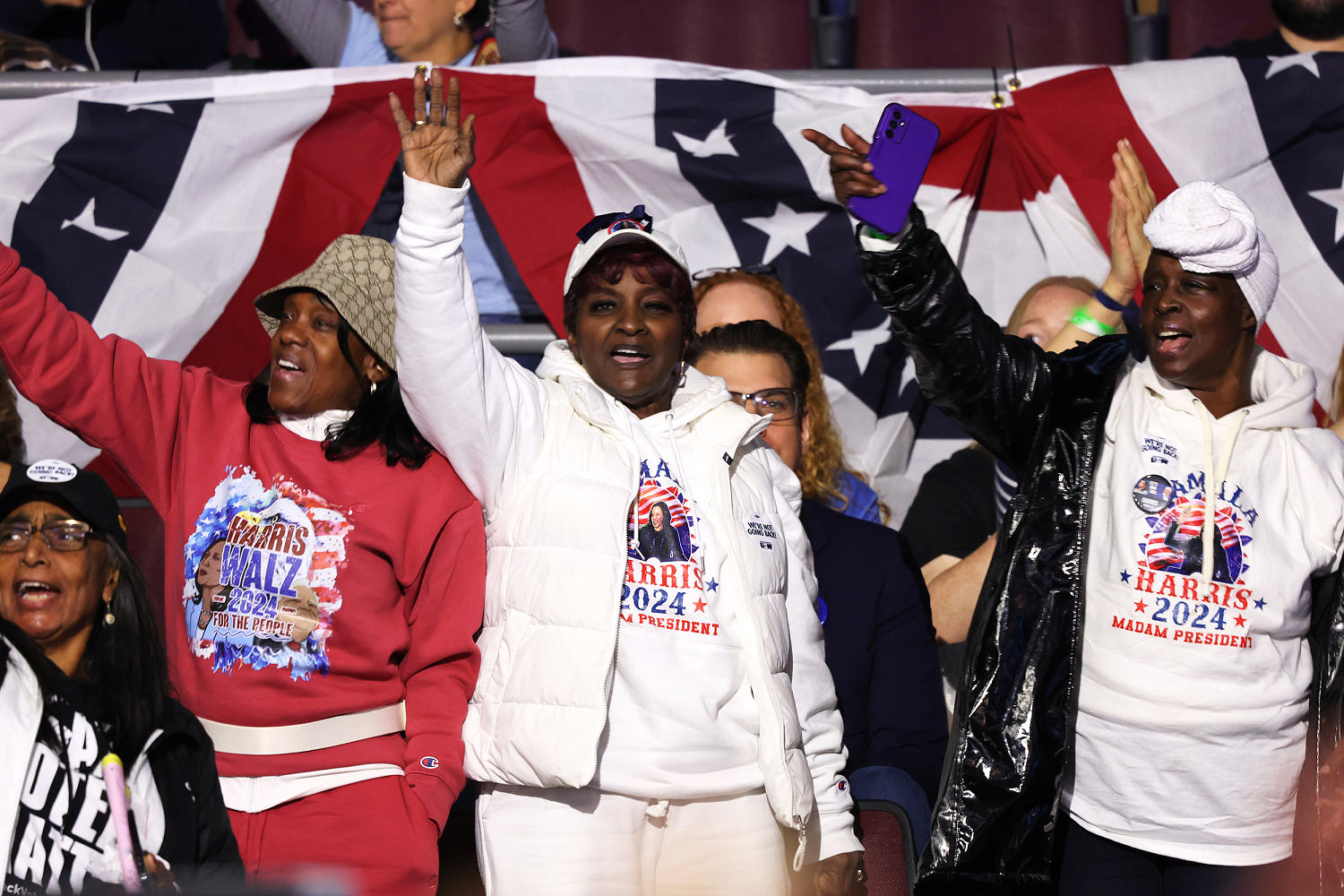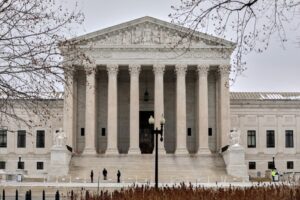Politics
The Democrats’ Black voter crisis is overblown

Do the Democrats have a Black voter problem? If you’re plugged into the political news cycle, it certainly feels like they do. Former President Donald Trump has been boasting that he has “gone through the roof with Black men.” His predecessor, former President Barack Obama, has been admonishing Black men for seeming to balk at supporting Democratic presidential nominee Kamala Harris. Pundits have seized on the issue as an unexpected weakness for Harris and her party. In what may have been a response to all the hubbub, Harris released a policy rollout specifically aimed at appealing to Black men.
But Democrats ought to tune out Trump’s taunting and not panic. The general outlook of the political scientists I spoke to is that there isn’t enough reliable data to suggest that Harris is facing an emergency situation with Black voters. In fact, they pointed out that there are indicators that Harris could be on track to match Biden’s performance in 2020. (On average, exit polls found that Biden received the support of 87% of Black voters, while Trump received 12%.) That’s not to say that Harris should take the Black vote for granted or that she should neglect targeted outreach in Black communities. But fixating on questionable data over how much of the Black male vote she’ll get can distract from a lot of bigger issues that the party is facing.
The bigger issue comes down to whether Harris can turn out Black voters in big numbers.
A lot of the alarmist headlines are based on comparisons of previous elections to this year’s polls. That’s comparing apples and oranges: Polls are deeply flawed tools for predicting turnout. Hillary Clinton in 2016 and Joe Biden in 2020 overperformed with Black voters compared to polls prior to the election, said Christopher Towler, a professor at Sacramento State University who runs the Black Voter Project. Part of the reason is that polling captured sentiment from Black voters who were less supportive of Democrats but also less likely to vote. That very well could be happening this time as well.Another issue is that a lot of the national polls involve extrapolating off a relatively small number of Black respondents. “It tends to be the case in typical news media polls that Black men are under-sampled,” Chryl Laird, a political scientist at the University of Maryland, College Park, told me. That can distort numbers dramatically. Trump’s apparent doubling of Black supporters could potentially be explained by the margin of error with a small sample.
Towler’s Black Voter Project involves longitudinal and large-scale panel surveys of Black voters. His larger sample size makes his numbers more reliable, and his findings from a survey conducted from late July through mid-August found that Harris’ numbers were not necessarily in a dire state: Among likely Black voters asked who they’d vote for if they had to vote that day, 81% said they’d vote for Harris and 11% said Trump; 4% said they weren’t sure, 2% said they would vote for then-independent candidate Robert F. Kennedy Jr., 1% said they’d vote for Cornel West and 1% said they would not vote. (When given only the choice of Harris or Trump, the split was 84% for Harris and 12% for Trump.) Those numbers do not suggest that Democrats should panic. The survey began just days after Harris entered the race and ended shortly after she’d entered, and the results left her with room to grow. Trump’s support among Black voters in that survey roughly tracks with the level of support he got in 2020 and is a far cry from the shocking figures seen in national polls taken around the same time that used a smaller sample of Black voters.
Another poll focused specifically on a large set of Black voters in swing states, conducted in October by Howard University’s Initiative on Public Opinion, found that Harris had 84% support, Trump had 8%, and 8% remained undecided. Given trends in how Black voters generally break for Democrats, statistically speaking the undecided voters are most likely going to either break for Harris or not vote, Towler said.
Put it together and the more reliable statistics from larger samples of Black voters do not forecast a massive, game-changing defection to Trump. The bigger issue comes down to whether Harris can turn out Black voters in big numbers.
It cannot be ruled out that Harris could underperform Biden with Black voters, and Black men in particular. But that might be the wrong way to look at the issue, considering other trends in Democrats hemorrhaging voters. Harris seems to be performing worse among men overall than Biden was earlier in the race, according to successive New York Times-Siena polls. And Democrats continue to struggle to find a way to fight off Trump’s domination among non-college-educated voters. Focusing on small percentage drops of Black men — the population of voters who turn out second only to Black women in supporting Democrats — may obscure the bigger, more worrying trend lines that Democrats face. Based on what we know, it’s blinkered to argue that the Democrats’ crisis is with Black voters.
It is striking that Harris looks like she’s not coming close to generating “the Obama effect” among Black voters — in 2008, he garnered the support of 95% of Black voters and generated historic turnout. A number of factors could be at play. Obama may have monopolized the excitement of being the first Black president (who also disappointed many on the left and oversaw a massive drop in Black wealth while in office). Obama had more time and more charisma on his side. And sexism against Harris could be suppressing enthusiasm about her.
Either way, with the tight margins of the race, Harris’ ability to generate high Black turnout will be crucial. That means making sure to spend more resources on targeting Black voters with the right messaging and get-out-the-vote operations. Neither history nor the evidence, however, suggests Trump’s support from Black men is anywhere close to going through the roof.
Zeeshan Aleem is a writer and editor for BLN Daily. Previously, he worked at Vox, HuffPost and Blue Light News, and he has also been published in, among other places, The New York Times, The Atlantic, The Nation, and The Intercept. You can sign up for his free politics newsletter here.
Politics
White House wants a reprieve in spy-powers fight that is splitting the GOP

The Trump administration is pushing for a clean extension of Section 702 surveillance authority ahead of an April deadline…
Read More
Politics
White House wants a reprieve in spy-powers fight that is splitting the GOP
The Trump administration is pushing for a clean extension of Section 702 surveillance authority ahead of an April deadline…
Read More
-

 The Dictatorship1 year ago
The Dictatorship1 year agoLuigi Mangione acknowledges public support in first official statement since arrest
-

 Politics1 year ago
Politics1 year agoFormer ‘Squad’ members launching ‘Bowman and Bush’ YouTube show
-

 The Dictatorship5 months ago
The Dictatorship5 months agoMike Johnson sums up the GOP’s arrogant position on military occupation with two words
-

 Politics1 year ago
Politics1 year agoBlue Light News’s Editorial Director Ryan Hutchins speaks at Blue Light News’s 2025 Governors Summit
-

 Politics1 year ago
Politics1 year agoFormer Kentucky AG Daniel Cameron launches Senate bid
-

 The Dictatorship1 year ago
The Dictatorship1 year agoPete Hegseth’s tenure at the Pentagon goes from bad to worse
-
Uncategorized1 year ago
Bob Good to step down as Freedom Caucus chair this week
-

 Politics10 months ago
Politics10 months agoDemocrat challenging Joni Ernst: I want to ‘tear down’ party, ‘build it back up’







